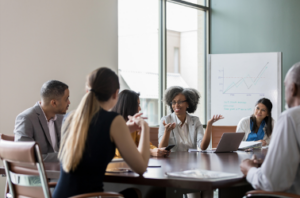
In the middle of a Covid-19 lockdown packed with distance learning difficulties, teachers at the Schmalkalden Elementary School in Thuringia, Germany, learned that the digital tool they had been using didn’t meet the country’s strict data-privacy restrictions. “A parent at the school asked whether I could develop a program from scratch over the weekend,” said Mathias Wickenhagen, a 20-year-old programmer in the neighborhood. “And I did.”
TaskCards, the online platform that Wickenhagen developed, is a digital pin board inspired by Padlet. Originally intended as a quick save for just a few teachers in eastern Germany, TaskCards has become widely popular throughout Europe.
Across the world, Chloe Yan, a 17-year-old Californian, walked into her computer science class in 2019 and noticed the absence of girls. The lack of support inspired her to find a community, so she joined GirlGenius, an entirely virtual international nonprofit that connects young women interested in STEM fields (science, technology, engineering and math) through panels, workshops, and an online magazine. Since then, she has become executive director of the magazine.
While these international nonprofits have been thriving in virtual settings, the world is slowly approaching a post-pandemic era. In anticipation of that day, these organizations plan to adapt just as quickly to in-person activities as they adapted to the digital realm, all in order to better serve their communities.
Up until now, TaskCards has solely operated virtually – after all, it was created as a result of the switch to online learning. Without it, teachers would have had to deliver paper handouts to their students’ doorsteps. Since his own school experience wasn’t long ago, Wickenhagen understood what teachers and their students needed in order to learn from a distance. And he sees that their interest in digital solutions remains – even as schools reopen. “We weren’t interested in profiting from data collection or turning a huge profit,” Wickenhagen said. “From the start, this was meant to help teachers and students. We want to tailor TaskCards to meet their needs, to make it a really useful tool.”
For GirlGenius, which is based in the United States and serves girls around the world, the pandemic caused no significant harm. Rather, the organization saw stay-at-home orders as an opportunity to start new initiatives. GirlGenius has hosted about 40 online events, with its summer 2020 STEAM conference drawing more than 2,000 participants. The organization has also developed technical workshops in animation, panels with women in STEM fields, and “Ask Me Anything” sessions with women who are well established in STEM. All of these virtual events were launched in response to increased online activity because of the pandemic. But as schools and public places around the world open up, nonprofits that operate entirely virtually face a new challenge: keeping their momentum going now that people are returning to local, in-person resources.
The founders of Corona School recently decided to rename their organization Lern-Fair (Learn-Fair in English) in response to the movement back to in-person activities. More than 15,000 volunteers are today helping to increase nonprofit support for their communities. (A quick aside: For anyone interested in the recently launched special initiative to help Ukrainian refugees in learning and/or improving their German, check out this website.
Meanwhile, TaskCards is catching on across Europe, with licensing requests from Austria to Finland and the United Kingdom. In the U.S., GirlGenius is seeking to turn its virtual magazine into a print publication as physical libraries reopen their doors. Other nonprofits are looking ahead to a post-pandemic era, too. Telementors, a Texas-based organization created by high schoolers Amruth Nandish and Saathwik Saladi during the pandemic, connects children of healthcare workers to student mentors. Now the group is expanding services to other children with an eye to a post-pandemic world. Afghan refugees and young cancer patients are just two groups it has targeted. “Members of the Afghani national army and their kids have to flee the country for different political reasons, so we started offering sessions to their kids,” said Nandish, 17-year-old founder and director of Telementors. “Also, children with cancer are always in some isolation – post-Covid, pre-Covid, and during Covid. If they got that interaction with a teenage mentor, that would bring some light into their day, so that’s what our next venture is.”
Even before the pandemic, teenagers proposed unique solutions to solving problems in their communities. As vaccination rates increase and institutions find ways to provide in-person experiences, teenagers are equipping their organizations to tackle these changes and serve the public in new ways.
3,947 Total Views, 7 Views Today






